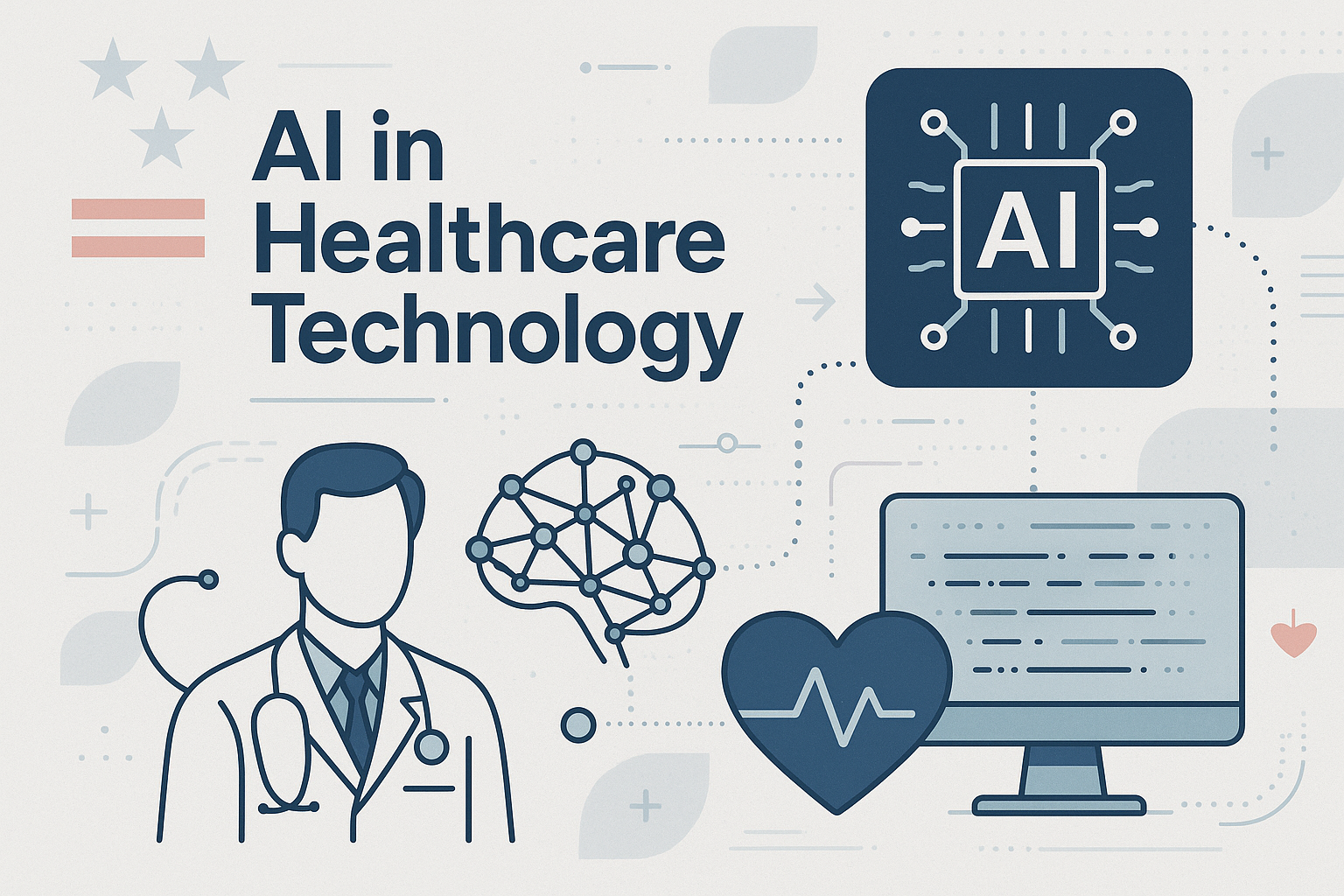
AI in Healthcare Technology: Transforming U.S. Medical Innovation in 2025
Artificial Intelligence (AI) is revolutionizing healthcare technology across the United States. From predictive analytics to robotic surgery, AI-driven solutions are enhancing patient outcomes, streamlining operations, and reducing costs. In 2025, the integration of AI in healthcare technology is not just a trend—it’s a necessity for providers, payers, and patients alike.
How AI in Healthcare Technology is Shaping the Future of Medicine
AI in healthcare technology is enabling smarter diagnostics, personalized treatments, and efficient administrative workflows. Let’s explore the key areas where AI is making a significant impact:
🏥 AI-Powered Diagnostics and Imaging
AI algorithms analyze medical images (X-rays, MRIs, CT scans) with remarkable accuracy, often matching or surpassing human radiologists.
- Faster diagnosis: AI reduces turnaround time for imaging results.
- Higher accuracy: Machine learning models detect anomalies that may be missed by the human eye.
- Early detection: AI identifies early signs of diseases like cancer, stroke, and heart disease.
TIP: Hospitals using AI-powered imaging solutions report up to a 30% reduction in diagnostic errors.
📦 Streamlining Administrative Tasks with AI
Healthcare providers are leveraging AI to automate routine administrative tasks, such as:
- Patient scheduling and reminders
- Insurance claims processing
- Electronic health record (EHR) management
This automation frees up valuable time for clinicians to focus on patient care.
🧬 Personalized Medicine and Predictive Analytics
AI in healthcare technology enables the analysis of vast datasets to tailor treatments for individual patients.
- Genomic data analysis: AI identifies genetic markers for disease susceptibility.
- Predictive risk modeling: Machine learning predicts patient outcomes and readmission risks.
- Treatment optimization: AI suggests the most effective therapies based on patient history.
🤖 Robotic Surgery and Virtual Assistants
Robotic-assisted surgeries, guided by AI, offer:
- Minimally invasive procedures
- Reduced recovery times
- Enhanced precision
AI-powered virtual assistants support clinicians with real-time information, medication reminders, and patient monitoring.
Top 10 AI in Healthcare Technology Solutions in the U.S. (2025)
Here’s a ranked list of the leading AI healthcare technology platforms making waves in the U.S. market:
- IBM Watson Health
- Google Health AI
- Microsoft Cloud for Healthcare
- Tempus AI
- PathAI
- Aidoc
- Butterfly Network
- Olive AI
- Viz.ai
- Caption Health
Side-by-Side Comparison Table
| Rank | Solution | Primary Use Case | Key Feature | U.S. Market Presence |
|---|---|---|---|---|
| 1 | IBM Watson Health | Clinical Decision Support | Natural Language Processing | Extensive |
| 2 | Google Health AI | Medical Imaging | Deep Learning Algorithms | Expanding |
| 3 | Microsoft Cloud for Healthcare | Data Integration | Secure Cloud Infrastructure | Broad |
| 4 | Tempus AI | Precision Oncology | Genomic Data Analysis | Strong |
| 5 | PathAI | Pathology Diagnostics | AI Pathology Review | Growing |
| 6 | Aidoc | Radiology Workflow | Real-Time Triage | Significant |
| 7 | Butterfly Network | Portable Ultrasound | AI Imaging Interpretation | Rapidly Growing |
| 8 | Olive AI | Revenue Cycle Automation | Workflow Automation | Widespread |
| 9 | Viz.ai | Stroke Detection | Real-Time Alerts | Expanding |
| 10 | Caption Health | Cardiac Ultrasound | AI-Guided Scanning | Emerging |
Key Benefits of AI in Healthcare Technology for U.S. Providers and Patients
✅ Improved Patient Outcomes
AI-driven diagnostics and personalized care plans lead to better health results and lower mortality rates.
✅ Cost Reduction and Operational Efficiency
Automation and predictive analytics help hospitals save millions annually by reducing unnecessary tests, optimizing staffing, and minimizing errors.
✅ Enhanced Patient Experience
Virtual assistants and chatbots provide 24/7 support, appointment scheduling, and medication reminders, improving patient engagement and satisfaction.
Challenges and Considerations for AI in Healthcare Technology
While the benefits are substantial, there are challenges to address:
- Data privacy and security: Ensuring HIPAA compliance and safeguarding patient information.
- Bias and fairness: Preventing AI models from perpetuating health disparities.
- Integration: Seamlessly incorporating AI into existing healthcare IT systems.
TIP: Regular audits and transparent AI model development are essential for maintaining trust and compliance in healthcare AI applications.
The Future of AI in Healthcare Technology: What to Expect in 2025 and Beyond
The U.S. healthcare sector is poised for even greater AI adoption in the coming years. Expect advancements in:
- Remote patient monitoring: AI-powered wearables and telehealth platforms.
- Drug discovery: Accelerated by AI-driven simulations and modeling.
- Population health management: Predictive analytics for public health interventions.
Conclusion
AI in healthcare technology is fundamentally transforming the U.S. medical landscape in 2025. From diagnostics and personalized medicine to administrative automation and robotic surgery, AI is driving innovation, improving outcomes, and making healthcare more accessible and efficient. As adoption accelerates, healthcare organizations that embrace AI will be best positioned to deliver superior care and thrive in the evolving digital health ecosystem.